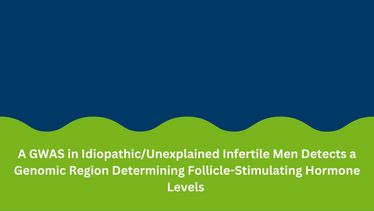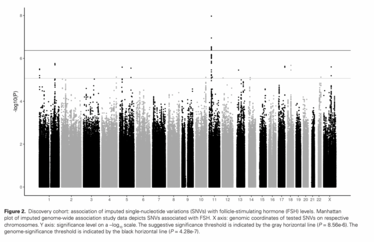A GWAS in Idiopathic/Unexplained Infertile Men Detects a Genomic Region Determining Follicle-Stimulating Hormone Levels
About 70% of infertile men are diagnosed with idiopathic (abnormal semen parameters) or unexplained (normozoospermia) infertility, with the common feature of lacking etiologic factors. Follicle-stimulating hormone (FSH) is essential for initiation and maintenance of spermatogenesis. Certain single-nucleotide variations (SNVs ie, FSHB c.–211G > T, FSHR c.2039A > G) are associated with FSH, testicular volume, and spermatogenesis.
It was unknown to what extent other variants are associated with FSH levels and therewith resemble causative factors for infertility.
We therefore aimed to identify further genetic determinants modulating FSH levels in a cohort of men presenting with idiopathic or unex¬plained infertility.
In this retrospective study, we selected 1900 men with idiopathic/unexplained infertility. In the discovery study, a genome-wide association study (GWAS) was performed in 760 men and association with FSH values was performed. Imputation revealed 9 SNVs in high linkage disequilibrium, with genome-wide significance (P < 4.28e-07) at the FSHB locus 11p.14.1 being associated with FSH. The 9 SNVs accounted for up to a 4.65% variance in FSH level. In the validation study (n = 1140), TaqMan SNV polymerase chain reaction was conducted
and a significant association for rs11031005/rs10835638 with FSH (P = 4.71e-06/5.55e-07) and FSH/luteinizing hormone ratio (P = 2.08e-12/6.4e-12) was evident
With this GWAS we delineated the polymorphic FSHB genomic region as the main determinant of FSH levels in men with unexplained or idiopathic infertility. Given the essential role of FSH, molecular detection of one of the identified SNVs that causes lowered FSH and therewith decreases spermatogenesis could resolve the idiopathic/unexplained origin by this etiologic factor.



